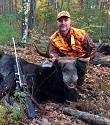 For nine exciting days, from October 17 to 25, 2015, lucky moose permit holders and their hunting partners will have the experience of a lifetime taking part in New Hampshire’s annual moose hunt. A total of 105 permit holders were drawn in this year’s lottery, randomly selected by computer from a pool of more than 9,500 applicants. In addition, two hunters will have the chance to hunt moose because they were the highest bidders
For nine exciting days, from October 17 to 25, 2015, lucky moose permit holders and their hunting partners will have the experience of a lifetime taking part in New Hampshire’s annual moose hunt. A total of 105 permit holders were drawn in this year’s lottery, randomly selected by computer from a pool of more than 9,500 applicants. In addition, two hunters will have the chance to hunt moose because they were the highest bidders
in an annual auction that benefits the Wildlife Heritage Foundation of New Hampshire, and one permit was granted to a youth with a serious medical condition through the Hunt of a Lifetime program. Last fall (2014), New Hampshire hunters had a statewide success rate of 72%.
Each hunter with a moose permit is assigned to hunt in one of 22 wildlife management units throughout the state. Most have spent the past several weeks or months scouting out potential hunting spots in their assigned areas. After taking a moose, hunters must have the animals registered and inspected at one of six check stations around the state. There, wildlife biologists check each moose to collect information about the overall health of the moose herd. Moose check stations draw many interested onlookers, a reminder of the economic and symbolic importance of moose in New Hampshire, particularly in the North Country. You can find a list of moose check stations at www.huntnh.com/hunting/moose.html.

Whether or not you’re hunting moose this year, get into the spirit of the adventure with a limited-edition 2015 New Hampshire moose hunt commemorative shirt! The new collection is available online at www.shopwildnh.com.
The moose hunt has been an annual event in New Hampshire for more than twenty years. The state’s first modern-day moose hunt took place in 1988, with 75 permits issued in the North Country. At that time, New Hampshire was home to about 1,600 moose. Today, New Hampshire has about 4,000 moose.
Hunters are reminded to avoid consuming moose liver and kidney. Studies conducted byFish and Game and the U.S. Fish & Wildlife Service have revealed high levels of cadmium in some moose livers and kidneys sampled. As a result, officials from the Environmental Health Program at the N.H. Department of Environmental Services recommend that no moose kidney be eaten, and preferably no liver. If individuals do choose to eat moose liver, it should be from moose no older than 1.5 years. If the moose is older than that, consumption should be limited to a maximum of two meals (assuming six ounces per meal) of moose liver per year. Biologists at moose check stations can determine the age of the animal for hunters. If you have questions about this issue, call David Gordon, DES Environmental Health Program, at 603-271-4608.
Visit a photo gallery of past successful N.H. moose hunters — and find out more about moose hunting in New Hampshire — at www.huntnh.com/hunting/moose.html.
